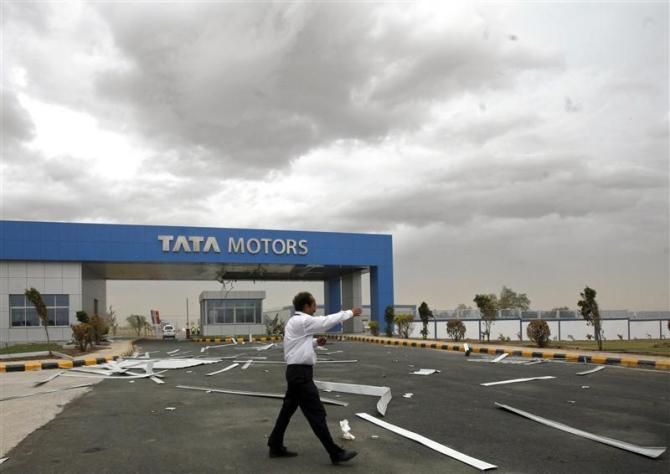 About 2,500 employees work at the Nano plant, including engineers, administrative and other staff
About 2,500 employees work at the Nano plant, including engineers, administrative and other staff
At a time when Tata Motors is set to roll out its new hatchback Tiago from Sanand plant in Gujarat, about 400 workers at the site went on a flash strike on Tuesday demanding re-instatement of 28 suspended workers.
Tata’s Sanand plant does not have a trade union or politically-affiliated labour union so far.
Deputy labour commissioner of Ahmedabad zone, V V Pandya, confirmed the development and said that 422 workers are on strike at the plant.
“The management has taken a proactive stance, and is open to negotiations.
However, since this is not a unionised agitation, there is no institutional leader of the workers at the moment, thus making the negotiations difficult,” Pandya told Business Standard. These workers are on direct payroll, Pandya clarified.
A Tata Motors spokesperson said in a statement, “Around 300 workmen of Tata Motors, Sanand Plant, have gone on an illegal flash sit-in strike on February 22, 2016, demanding re-instatement of the workmen suspended (pending enquiry) for serious misconduct.
"While the Management team is continuing to make efforts to talk to the workmen on strike and convince them to restore normalcy, plant operations are simultaneously continuing."
The conflict began around Diwali when a group of workers demanded pay hike so that they could be exempted from the Employees’ State Insurance deductions.
Pandya said average worker’s salary at the plant around Diwali was Rs 13,000-13,500 per month.
If this amount is raised to Rs 5,000 per month, they would be exempted from ESI deductions.
"Workers actually preferred the company-run health scheme over the ESI scheme,” he said, adding that the company also in-principle agreed to implement the wage hike.
However, Pandya said, two workers were suspended by the company for agitating. Recently, after an enquiry, the management decided not to take these workers back.
This is when the remaining workers protested, demanding re-instatement of the sacked employees.
On Monday, action was taken against 26 workers when they allegedly incited other workers and damaged some property.
Gujarat labour department sent its team to the site on Monday night.
On Tuesday morning, some workers congregated and resorted to a tools-down strike.
About 2,500 employees work at the Nano plant, including engineers, administrative and other staff.
Pandya said about 550 employees work on the shop floor.
The assistant labour commissioner and government labour officer were trying to end the deadlock. Pandya said if negotiations do not yield results within the next three days, the strike could be stretched further.
The company on its part said, "There have been continued agitations for further monetary increases as well as protests against disciplinary actions against those instigating the workmen, resulting in serious threat to company personnel as well as losses due to tampering.
"Viewed as attempts to coerce the Management, around 20 workmen have been suspended (pending enquiry) on various charges of serious misconduct."
A spokesperson said, "Tata Motors has enjoyed cordial relations with its workmen since start of its operations in Sanand in 2010."
Around 42,561 Nano cars were produced from the Sanand factory between January 2014 and December 2015, against the installed capacity of 250,000 cars per annum.
The conflict began around Diwali when a group of workers demanded pay hike so that they could be exempted from the Employee State Insurance deductions.
Pandya said average worker’s salary at the plant around Diwali was Rs 13,000-13,500 per month.
If this amount is raised to Rs 5,000 per month, they would be exempted from ESI deductions.
“Workers actually preferred the company-run health scheme over the ESI scheme,” said Pandya. The company is said to have agreed in-principle to implement the wage hike.
However, Pandya said, two workers were suspended by the company for agitating.
Recently, after an enquiry, the management decided not to take these workers back. This is when the remaining workers protested, demanding re-instatement of the sacked employees.
On Monday, action was taken against 26 workers when they allegedly incited other workers and damaged some property.
Gujarat labour department sent its team to the site on Monday night.
On Tuesday morning, some workers congregated and resorted to a tools-down strike. Around 2,500 employees work at the Nano plant, including engineers, administrative and other staff.
Pandya said about 550 employees work on the shop floor.
The assistant labour commissioner and government labour officer were trying to end the deadlock. Pandya said if negotiations do not yield results within the next three days, the strike could be stretched further.
The company, on its part, said, “There have been continued agitations for further monetary increases as well as protests against disciplinary actions against those instigating the workmen, resulting in serious threat to company personnel as well as losses due to tampering.
"Viewed as attempts to coerce the Management, around 20 workmen have been suspended (pending enquiry) on various charges of serious misconduct.”
A spokesperson said, “Tata Motors has enjoyed cordial relations with its workmen since start of its operations in Sanand in 2010.”
Around 42,561 Nano cars were produced from the Sanand factory between January 2014 and December 2015, against the installed capacity of 250,000 cars per annum.
Image: Tata Nano car plant at Sanand in Gujarat. Photograph: Amit Dave/Reuters


.jpg)









 © 2025
© 2025